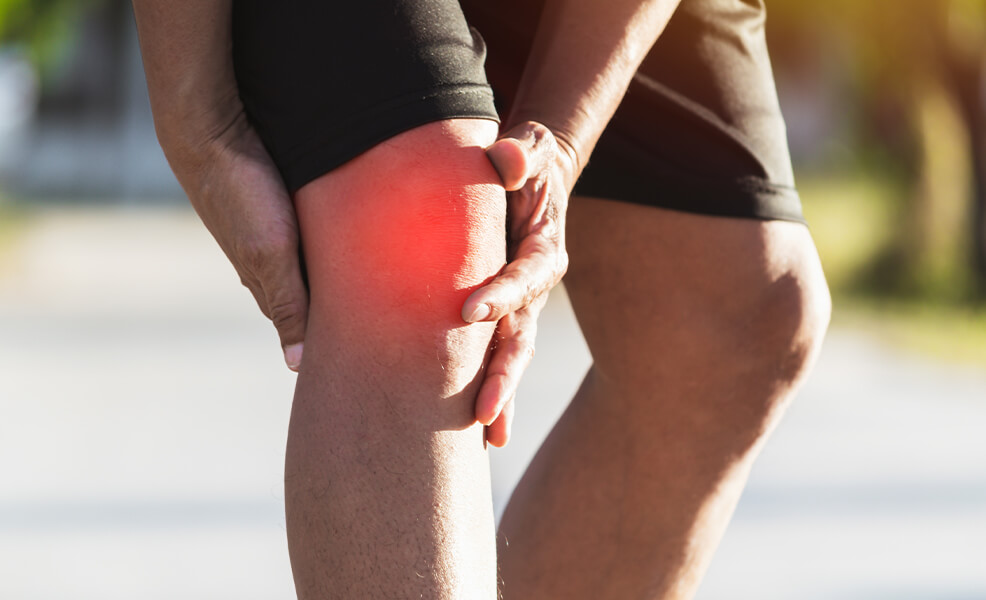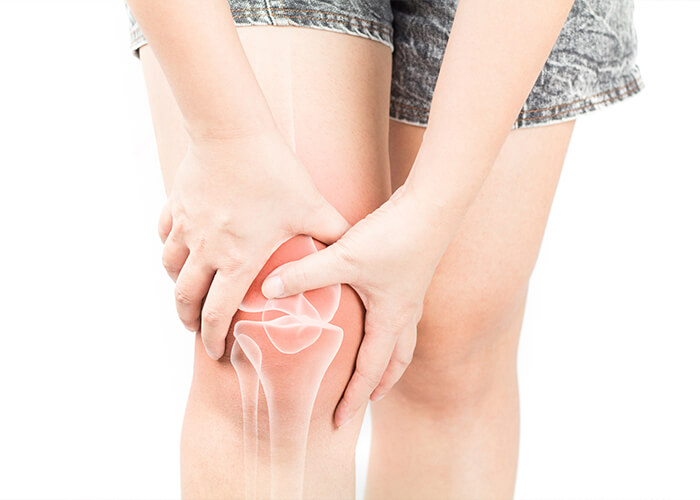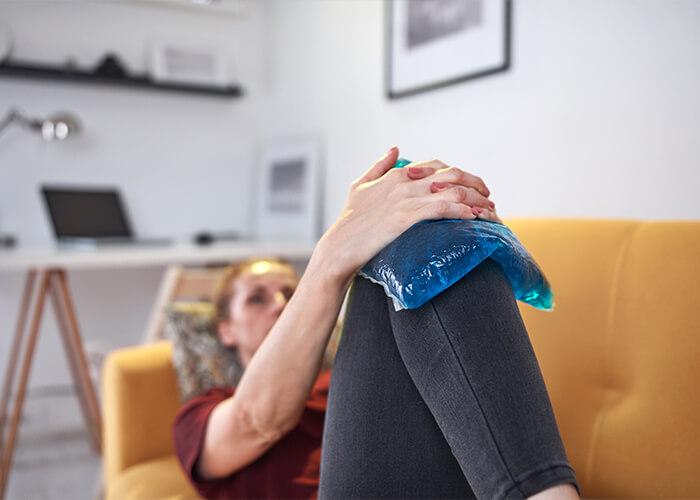
A swollen knee with pain is a common complaint among individuals above the age of 40. Furthermore, research shows that it’s also common in young people. Typically, knee pain shouldn’t raise any red flags or cause excessive concern; however, in some cases, it can result in immense discomfort for the patient. At MyMSK clinic, we believe that any discomfort should be dealt with no matter how subdued it may be. After all, it’s always better to deal with a problem as soon as possible. In this article, we’ll go over common causes for knee swelling and pain, a few steps you could take to alleviate it at home, and some effective treatments offered at the MyMSK clinic. So, without further ado, let’s dive into it!
Symptoms Of Swollen Knee:
Symptoms of swollen knees are often very clear; here are a few common ones:
-
- Swelling: A Swollen knee will usually be enlarged in size and soft to the touch. This is due to an accumulation of fluid in the region. Often, the swelling is also accompanied by pain.
-
- Stiffness: You may feel a sensation of tightness in and around the knee joint, which may be accompanied by pain, difficulty in moving the joint, and swelling. Stiffness can occur because of a variety of reasons, and it’s better to consult a doctor if stiffness persists for longer periods of time.
-
- Pain: Pain in the knees will often be accompanied by other symptoms such as stiffness, difficulty in moving, and swelling. Pain can be caused by a variety of diseases, injuries, or lifestyle choices as well.
Causes Of Swollen Knee:

It’s quite difficult to tell what exactly causes knee pain and swelling, as there can be multiple reasons behind it. The cause usually varies from person to person. Now that we’ve taken a look at the common symptoms of a swollen knee, let’s take a look at its most prominent causes:
1. Knee Bursitis:
Knee bursitis is an inflammation of your knee’s bursa. The bursa is a fluid-filled sac that acts as a cushion between a bone and a tendon. Common symptoms of knee bursitis include tenderness in the knee, pain or difficulty in moving, stiffness, and swelling. Knee Bursitis is usually caused by repetitive movement, injury, or excessive pressure on your knees. Typically, people over the age of 50 tend to fall victim to knee bursitis although in younger patients it may be an occupational hazard.
2. Ligament Injury:
Ligament injury can be split into a partial or complete tear of a specific ligament in the knee, resulting in knee pain, swelling, and difficulty moving the leg. ACL injuries are most common in sports that involve rotating or cutting movements such as Football. Accidents or falls involving significant trauma are also a common cause of ligament injury. The most commonly injured ligaments are usually the Medial Collateral Ligament (MCL) and Anterior Cruciate Ligament (ACL). When the MCL tears, the medial meniscus may also sustain an injury.
3. Arthritis
Arthritis is characterised by swelling and tenderness in one or more joints. Joint pain and stiffness are common symptoms of arthritis. Other symptoms include redness, warmth, swelling, and a reduction in the range of motion of the affected joints. Arthritis can be caused by joint cartilage wear and tear, metabolic abnormalities, infections, or autoimmune diseases. Researchers are not sure as to why, but arthritis is more common amongst women than men.
4. Gout
Gout is a type of arthritis characterised by Joint Inflammation caused by an excess of uric acid. A major symptom of Gout is a sudden onset of severe joint pain. Other symptoms include tender joints, joint warmth, joint redness, swelling, and joint destruction. Excessive meat and seafood consumption, obesity, heart disease, kidney disease, and even genetics can all contribute to gout. Younger people may also suffer from Gout although it is more common after the age of 50.
5. Tendinitis
Inflammation of the tendon (a thick tissue that connects muscles to bones) causes this condition. A person suffering from this condition feels pain and tenderness just outside the joint. Tendinitis can affect any of your tendons, but it is most common in your shoulders, elbows, wrists, knees, and heels. The symptoms of tendinitis include pain, stiffness or loss of motion in the affected joint, tenderness, and mild swelling. Tendinitis can be caused by repetitive trauma or stress, calcium deposits along the tendon, infections. It commonly occurs in people between the ages of 35 and 50.
6. Septic Arthritis
Septic arthritis occurs as a result of an infectious agent invading the knee (usually Staph Aureus) Its symptoms typically include redness, heat, pain, and swelling in the knee, in addition to a decreased ability to move the joint. Its onset is usually quick, and it may affect more than one joint in some cases, particularly in babies and young children. Septic arthritis is usually caused by bacteria entering the bloodstream. Having open wounds, repetitive knee surgery, diabetes, smoking, and a weak immune system can all put you at a greater risk of contracting septic arthritis.
Diagnosis of Swollen Knee:
Now that we’ve taken a look at the causes of a swollen knee and pain, let’s see how we diagnose it at MyMSKClinic. Here at MyMSKClinic, we diagnose the cause of a swollen knee using Imaging Tests. Occasionally the Joint Aspiration may also be required
Imaging Tests
-
- X-ray: X-ray is a basic investigation to check for joint damage or loose bodies or degree of degeneration in Arthritis
-
- Ultrasound: Very useful in Joint swelling to assess the extent and possible cause of the swelling in addition to guiding the needle for aspiration or injection.
-
- MRI: Very useful for imaging soft tissue structures in the knee and diagnosing ligament or meniscus tears, grading the extent of cartilage damage and general joint pathology.
Joint Aspiration
Joint aspiration is a procedure that uses a needle and syringe to remove fluid from the space around your knee. This is typically performed under local anaesthetic to relieve swelling or to obtain fluid for analysis to diagnose a joint disorder or problem such as Gout or Septic Arthritis.
Treatment of a Swollen Knee:
The first thing you should do after you notice that your knee is swollen is to sit down and avoid walking. Put your leg in a position that does not cause any pain and try a period of rest.

Rest is very important for recovery, so in most cases you should give your knee time to heal. Use ice to alleviate any pain; this will also help with reducing swelling and redness. However, if the pain or swelling persists, you must visit a doctor as soon as you can, and in the meantime, make sure to only move your leg the bare minimum.
Based on the symptoms, the doctor may prescribe anti-inflammatories which will help you relieve the pain and recover faster. The doctor may also use a cortisone injection which will help get rid of the pain quicker.
Based on your general health and condition, and if there is Arthritis or ligament/meniscal injury, the doctor may use prolotherapy to give the knee joint some pain relief and stability.
So, when should you see a doctor? as soon as possible. Visiting a doctor would help you diagnose the underlying cause of the swollen knee to devise an effective and treatment plan.
With this in mind, Dr Amir from the MyMSKClinic is one of the best Osteopaths in the Manchester and Burnley area. With his ample years of experience in treating chronic knee pain and injuries, he’ll make sure you’re knee receives optimal care.
Final Thoughts:
This article aims to educate you on the symptoms, causes, diagnosis, and treatment methods for a swollen knee. Most importantly, it highlights how you can manage your swelling and knee pain at home. However, this does not mean that you can ignore your knee pain and put it down to a simple strain that will get better soon.
If you’re experiencing any of the symptoms discussed throughout the article, it’s best to visit a doctor as soon as possible. For many people, especially over the age of 35, it’s imperative that they don’t delay a doctor’s visit if they experience swelling in their knees with pain. This is because conditions like Septic Arthritis or bursitis early on makes it much easier to manage them effectively.
Frequently Asked Questions (FAQs):
Question 01: How to help a swollen knee?
Answer: As soon as you feel any restriction or difficulty in movement, stop the activity you’re doing and rest. Swelling and pain often come hand in hand, and one way to manage both is to use an ice pack. In the meantime, make sure not to exert your leg and keep your movements to a bare minimum. It is also advisable at this stage to consult a Doctor
Question 02: Why do I get a swollen knee and pain after running?
Answer: Knee pain and swelling often occur after repetitive movements, like running. Swelling after running may occur because of a variety of reasons, including tendinitis, bursitis, ligament injury, or meniscus. If your knees are swelling up and aching after running, it is imperative that you visit a physician as soon as you can. Till then, avoid running and try to rest as much as you can.
Question 03: Can a swollen knee be dangerous?
Answer: Yes, a swollen knee might indicate a serious underlying cause. If you experience severe symptoms in the form of a red, hot, and swollen knee, consult a doctor immediately. In the meantime, try to rest and try to keep your movement to a bare minimum. Ice packs can also help with lessening the severity of the symptoms.
Question 04: Who is the best Osteopath for managing Knee Pain and Swelling In Manchester?
Answer: Dr Amir at the MyMSK Clinic is one of the best osteopaths in the Manchester and Burnley area, having expertise in treating chronic knee pains and injuries. If you’re experiencing knee pain with swelling and limited range of motion, MyMSK Clinic is the best option for you. Here at MyMSK Clinic, we offer a wide range of treatment options for managing knee pain and swelling, including cortisone, hyaluronic acid, PRP, prolotherapy, etc. Simply Please Click here to book an assessment of your knee swelling with us, and let us help you live a better and healthy life.
